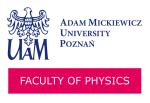Prof. dr hab. Michał Kurzyński
Prof. dr hab. Michał Kurzyński was born on July 7, 1946 in Poznań. He completed his school education in 1963, passing the matriculation exam at the high school no III in Poznań. In the same year he began his studies at the Faculty of Mathematics, Physics and Chemistry of the Adam Mickiewicz University in Poznań. After receiving MSc in physics in 1968, he decided to develop and improve his scientific knowledge by completing five-year PhD studies under the supervision of Prof. dr hab. Leon Kowalewski in the Department of Solid State Theory. He defended his PhD thesis entitled “Energy structure of small aggregates of exchange-coupled paramagnetic ions in crystals” in 1973. While working on the PhD dissertation, Prof. Kurzyński worked as an assistant at the Institute of Physics of the Adam Mickiewicz University. At the same time he met his future wife Krystyna, associated with the Astronomical Observatory of the Adam Mickiewicz University. The young couple soon became the happy parents of Anna and Paweł.
1946-2023
After completing his doctorate in 1973, he continued his scientific work at the Institute of Physics of the Adam Mickiewicz University as a senior assistant until 1981. During this period, he prepared his habilitation thesis entitled “Effects of strong electron-lattice coupling in transition metal compounds”, which he presented for review in the form of a monograph published in Wydawnictwo Naukowe UAM, and then defended in 1978, receiving a habilitation degree. In the period 1981-1992 Prof. Kurzyński was employed as an assistant professor at the Faculty of Mathematics and Physics of the Adam Mickiewicz University. In this extremely difficult period of political transformations in Poland, he held important administrative functions, first as the deputy director for teaching matters (1981-83), and from 1990 to 1993 he was the vice-dean of the Faculty of Mathematics and Physics. From 1992 he was employed as an associate professor, and in 1996, after obtaining the title of professor, he was appointed full professor.
Scope of his scientific research can be divided into two distinctly different thematic areas. The former concerned the physics of magnetism in spin systems and the statistical theory of structural phase transitions in solids. The latter, still developing in the 1980s, covered non-equilibrium statistical thermodynamics of biochemical reactions. At that time, Prof. Kurzyński made a number of trips to foreign universities, where his scientific interests in the field of biochemistry of enzymatic reactions and conformational dynamics of proteins were consolidated. He visited the Department of Theoretical Physics of the University of Oxford (September 1983, May 1988) and had two long-term stays in renowned research centers in Germany as part of the Alexander von Humboldt Foundation scholarship, first at the Institute of Theoretical Physics of the University of Stuttgart, directed by Prof. Hermann Haken (December 1983-November 1984, November-December 1989), then at the Max Planck Institute of Biophysical Chemistry in Göttingen, headed by Prof. Manfred Eigen (January-June 1990). In addition, as a visiting professor, he lectured, among others, at the University of Paris Nord (October 1989), the Canadian University of Alberta in Edmonton (November 2001), as well as at the Institute of Theoretical Physics of the Catholic University of Leuven (April-May 2008). He also gave guest lectures at the Universities of Rennes (October 2011, February 2013) and Saarbrücken (September 2012, February 2014). The thematic scope of these lectures was mainly devoted to the stochastic theory of biochemical processes, conformational dynamics of proteins, physical mechanisms of enzymatic catalysis and processes of free energy conversion in biological molecular machines.
Prof. Kurzyński is the author of over forty original scientific papers. He published in well-known and respected international journals, such as Physical Review, PNAS, Journal of Physical Chemistry, FEBS Letters, Journal of Physics C: Solid State Physics, Phase Transitions, Physica A and Journal of Statistical Physics. His scientific achievements include three books: “Necessity and Chance in Physics, From Laplace’s Demon to Broken Ergodicity” (OWN, Poznań 1993), “Introduction to Molecular Biophysics” (with J. Tuszyński, CRC Press, Boca Raton, 2003) and “The Thermodynamic Machinery of Life” (Frontiers Collection, Springer, 2006). He is also the author of a commentary on the operation of biological molecular machines
in a monograph that is a translation of R. Feynman’s article, “There’s plenty of room at the bottom” (together with G. Ślusarek and M. Banaszak, Wyd. Naukowe UAM, 2018). The fourth book of Prof. Kurzyński, devoted to the Foundations of Thermodynamics, remained the unfinished work of his life. He presented his scientific achievements at many national and international conferences.
Prof. Kurzyński promoted a large group of MSc and PhD students of physics. Three of the professor’s pupils obtained habilitation. His extremely professional, thorough and reliable reviews covered dozens of scientific articles, master’s theses, doctoral dissertations, habilitation procedures and proceedings for the conferment of the title of professor.
He treated research and teaching on equal footing. Prof. Kurzyński was a respected academic teacher, which resulted from his incredible passion for sharing knowledge about the universe. Let us point out here the impressive thematic diversity of course lectures and those popularising natural sciences, which he gave not only in Poland, but also abroad. These include lectures on Classical and Quantum Mechanics, Mathematical Methods of Physics, Solid State Theory, Statistical Physics and Thermodynamics, Non-Equilibrium Thermodynamics, Soft Matter Thermodynamics, Thermodynamics of Biological Processes, Molecular Biophysics, Membrane Biophysics, Biological Molecular Machines, Photosynthesis, Automata Theory and finally The structure of the universe. Lectures and classes conducted by prof. Kurzyński enjoyed great interest and recognition of many generations of physics students in Poznań.
We will remember him as a true enthusiast of science and a great erudite, a lover of philosophy and classical music, an extremely kind man with great personal culture and cheerfulness

